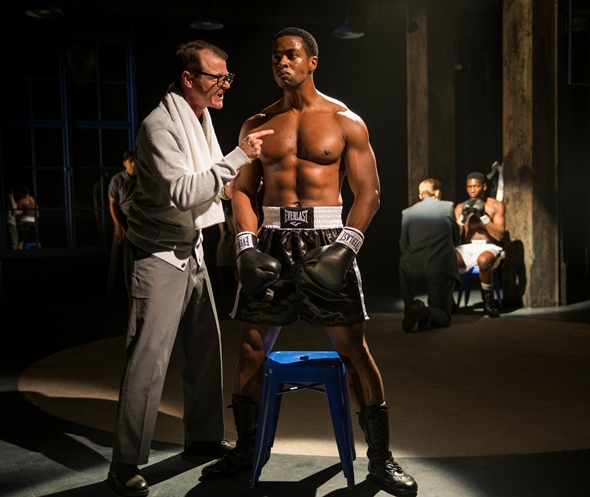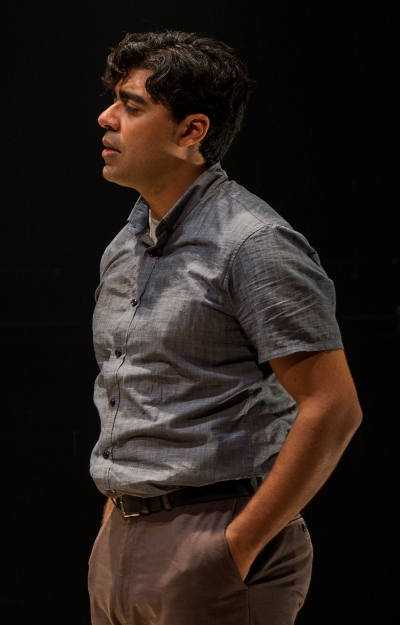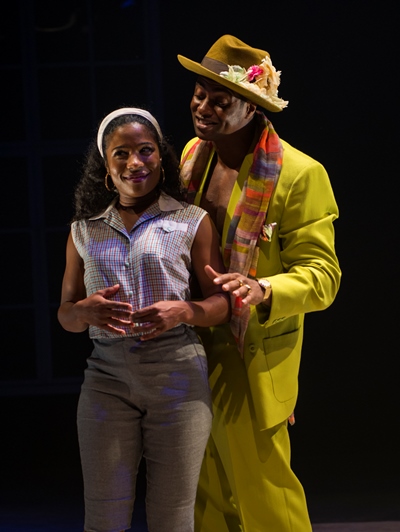‘Man in the Ring’ at Court: Landing 1-2 punch to pound out portrait of a fractured champion
 Review: “Man in the Ring” by Michael Cristofer, world premiere at Court Theatre through Oct. 16. ★★★★★
Review: “Man in the Ring” by Michael Cristofer, world premiere at Court Theatre through Oct. 16. ★★★★★
By Lawrence B. Johnson
The title of Michael Cristofer’s play “Man in the Ring,” now in its gripping world premiere run at Court Theatre, is double edged. Outwardly, the play is about the meteoric rise and brutal fall of boxer Emile Griffith, among the most dominant champions in pugilistic history. But it’s also, in the most essential way, about the loss of innocence and purity and the unfettered joy of being alive.
 I’m reluctant to call Cristofer’s nuanced work a bio-drama, closely connected though it is to the well-documented events of Griffith’s life. “Man in the Ring” resonates beyond the measure of one man to become an allegory of the human spirit bludgeoned by the hardness of the world and warped by the ugliness of necessity.
I’m reluctant to call Cristofer’s nuanced work a bio-drama, closely connected though it is to the well-documented events of Griffith’s life. “Man in the Ring” resonates beyond the measure of one man to become an allegory of the human spirit bludgeoned by the hardness of the world and warped by the ugliness of necessity.
Emile Griffith (1938-2013) was a six-time champion in the welterweight and middleweight divisions of professional boxing in the 1960s. But his many hundreds of rounds in the ring, and the many thousands of blows he absorbed, took a devastating toll on his brain. He began to suffer the effects of dementia even as his boxing career shifted into a long, desperate, tragic slide.
But there was another aspect of Griffith’s life that had shattering consequences in the ring. He was gay at a time when homosexuality wasn’t even discussed openly – until an opponent broke that code of silence and publicly mocked Griffith. In one violent, lightning burst of reprisal, when they met in the ring, Griffin pounded the taunting boxer into unconsciousness; he died a few days later. The incident haunted Griffith the rest of his life.
In Cristofer’s play, directed with consummate sensitivity by Charles Newell, we watch the rising young fighter and his doddering and confused older self — simultaneously, through a perfectly matched pair of disarmingly beautiful performances: Kamal Angelo Bolden as the exuberant kid just arrived in Manhattan from his native St. Thomas in the Virgin Islands, and Allen Gilmore as the boxer in his weathered years, a sweet-tempered old man, but one tormented by the unrelenting specter of some long-ago that ever recedes but will not vanish.
 When young Emile surprises his estranged mother (a robust and knowing turn by Jacqueline Williams), who has long since preceded him to New York, he’s bearing two things: a baseball bat and, for Mom, an elaborately beflowered hat, his own handiwork. Amazed that her son could have made such a thing, she rushes him straight to prospective employment – at a ladies’ hat shop. But the shopkeeper (Thomas J. Cox), who has a sideline as boxing manager, takes one look at Emile’s magnificent frame and asks, “Can you fight?”
When young Emile surprises his estranged mother (a robust and knowing turn by Jacqueline Williams), who has long since preceded him to New York, he’s bearing two things: a baseball bat and, for Mom, an elaborately beflowered hat, his own handiwork. Amazed that her son could have made such a thing, she rushes him straight to prospective employment – at a ladies’ hat shop. But the shopkeeper (Thomas J. Cox), who has a sideline as boxing manager, takes one look at Emile’s magnificent frame and asks, “Can you fight?”
So begins the bittersweet saga of an iconic and ill-starred boxer. Bolden cuts a credibly splendid figure in the ring even as he exudes irresistible charm outside the ropes, on the street, in a gay bar. This guy is the furthest thing from a killer; he’s in love with life. He’s a gifted prize fighter who’d really rather be dancing or strutting about town in the flashy new threads his winnings have bought.
Then his terrible gift takes a man’s life. He didn’t mean to kill. He will stop fighting. But quitting simply isn’t possible; he is the family meal ticket. And so he returns to the ring, and to face the same question from sports writers a thousand times: How does it feel to have killed a man? How does it feel, how does it feel, how does it feel? Then the tremors begin, and with them a unfamiliar toll of defeat. But Emile still answers the bell, though he now has some difficulty answering simple questions or remembering stuff.
 The elder Emile does remember. The bad things. Sometimes. Gilmore’s portrait of this gentle, bright-eyed, oblivious, broken-hearted man is a study in dramatic eloquence. The old boxer that was now lives his life, his days, in mental spasms, which Gilmore captures with crushing truth. Yet even in his perpetual muddle, he clings to a single clear wish: forgiveness. Perhaps that grace would exorcise his demons.
The elder Emile does remember. The bad things. Sometimes. Gilmore’s portrait of this gentle, bright-eyed, oblivious, broken-hearted man is a study in dramatic eloquence. The old boxer that was now lives his life, his days, in mental spasms, which Gilmore captures with crushing truth. Yet even in his perpetual muddle, he clings to a single clear wish: forgiveness. Perhaps that grace would exorcise his demons.
Gabriel Ruiz contributes a wisely measured performance as Emile’s youthful lover, then longtime care-giver, Luis. And Melanie Brezill, as the pretty girl Emile impulsively decides to marry, adds vitality to the landscape in that role and others. The whole ensemble also combines in dance and vocal riffs that sharpen the story’s edges.
All told, this tightly woven production is a theatrical masterpiece, solidly framed by set designer John Culbert and graphically illuminated by Keith Parham. Jacqueline Firkins’ costumes lend subtle – and not so subtle — detail to the narrative flow. Emile’s fine yellow suit and fancy fedora would stop traffic on Fifth Avenue in any decade.
Related Links:
- Performance location, dates and times: Details at TheatreinChicago.com
- Preview of Court Theatre’s complete 2016-17 season: Read it at ChicagoOntheAisle.com
Tags: Allen Gilmore, Charles Newell, Court Theatre, Gabriel Ruiz, Jacqueline Williams, Kamal Angelo Bolden, Man in the Ring, Melanie Brezill, Michael Cristofer, Thomas J. Cox

